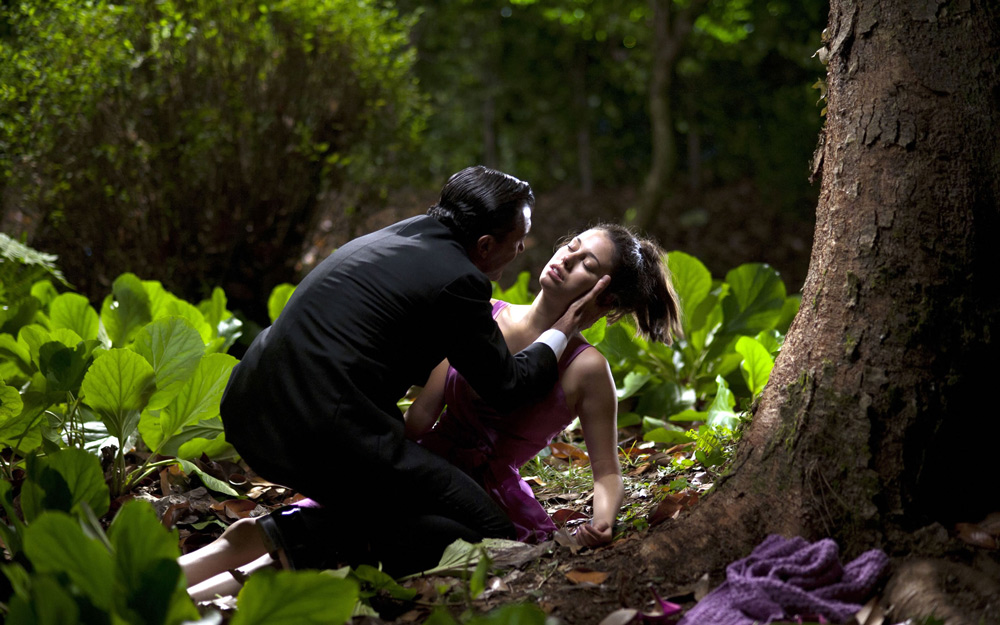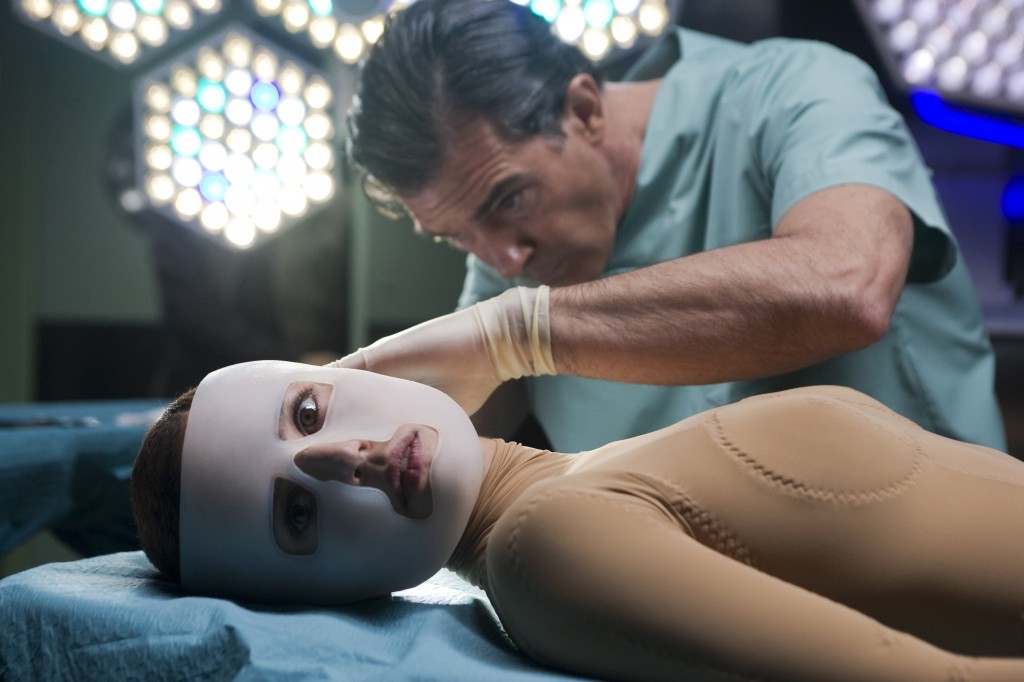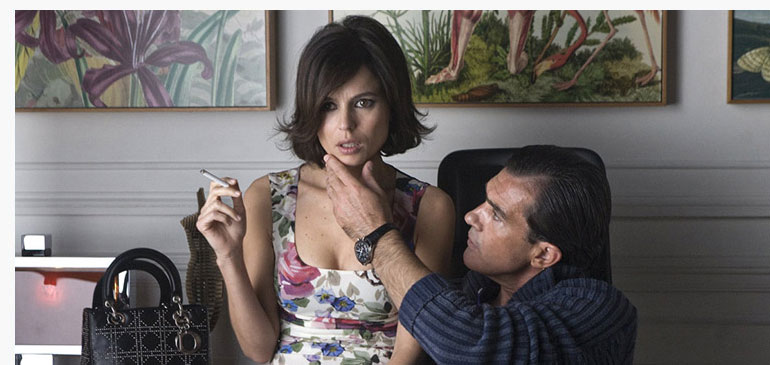
Antonio Banderas is wide awake in promotion of his new film The Skin I Live In, a Spanish import in English subtitles that is directed by the widely respected Pedro Almodóvar of “Volver” and “Talk to Her” fame. I’ve met Banderas before, and as gracious a man he is, I’ve never seen him this passionate. I think he is especially proud of his work as an off the deep end plastic surgeon who creates new skin tissue, to be used primarily for burn victims but in his character’s case has found another purpose. Banderas has all the right to be ecstatic for this occasion, because at least I feel, it is at the top of his very best work. Charming, deceitful, manipulative, controlling, obsessed and fixated – his mentally unsound doctor he portrays is deeply embedded in all those traits as he secretly lodges his first patient of a new unregulated experiment in a locked room, only to become aroused by her.
Reporting from Los Angeles.
How did Pedro Almodóvar first approach you with this role of maniacal surgeon Dr. Robert Ledgard?
Antonio: Pedro talked to me at the time that he bought the rights for the novel “Tarantula” while at the Cannes Film Festival 10 years ago. But then for all this time he got involved in other projects and nothing happened with it. I knew he was working all this time trying to adapt it in some personal way. I was very surprised knowing the fundamentals of the movie and the story but it surprised me that basically he was not going to shoot in a linear way. You start seeing the story of my character and then when the flashbacks start developing very late in the movie, you take the whole entire audience and reposition them in terms of morality. And that game and those U-turns go practically to the end. It surprised me like it’s now surprising to audiences throughout the world.
Would you say that you and Almodóvar agreed or disagreed in the development of your character?
Antonio: I will say that it was difficult. Thank God because working with Almodóvar is not an easy task. He’s unbelievably precise in the things that he wants from you. He doesn’t like you to come with a bag filled with experiences that you have been accumulating during the years as an actor. He loved to take all those amount of back experiences and just throw them out of the window. He tells you, ‘I want a new you and we are just going to attack the work and the character from a different perspective.’ So from the time he started describing the character and his psychopathology and how we were going to research him, he came to the main points that made me reflect very much about what we were going to do.
Does that mean to not portray Dr. Ledgard as such a conventional villain? To undertake your performance with what method?
Antonio: The psychopathology – the mental state of the character. He says these people and this character is somebody who could eventually melt perfectly into the society he’s living in.He is a character we’ve seen sometimes in the news. When they just arrest a serial killer… When journalists interview neighbors about him, they’d say he was a charming guy. Well dressed, very well-mannered, educated, polite, went to church on Sundays. But then he’s got a horrendous history behind him. And from that moment on we started working in that direction.
That almost sounds like saying that Dr. Ledgard doesn’t see himself as evil, right? And also like he hides it well?
Antonio: What I did was say to myself was, ‘You shouldn’t establish a morality judgment over him.’ I didn’t want to play the character like I was carrying a backpack of everything that he is. So what I did was just establish compartments in the days that we had to shoot. And I got the premise in my mind that I had to play him almost like he was a family doctor. Trying to make natural what wasn’t natural. What he’s doing is horrendous – but from the character’s point of view, he is actually doing something extraordinary for the work of science and for the future.
It’s true isn’t that it’s hard to not see Dr. Ledgard as at least some kind of a genius?
I didn’t want to play this as a bad guy. I had to naturalize because that’s what Pedro asked me to do… [Banderas becomes hushed and more refined] Very natural. Family doctor. I am doing good things.
Do you see it that he comes across as a character who deserves some compassion?
Antonio: There’s a scene at the end where people have said to me they think he is falling in love with this woman. I always thought he wasn’t falling in love with the woman but he was falling in love with himself – with the creation he has done. And when Pedro photographed me from the back, when I’m looking at her, it’s almost like he’s photographing himself looking at movies and jumping on the other side of the movie and becoming an actor in his own creation. It’s the type of game Pedro was playing at this particular time in his life.
Can you understand to any depth the father’s need for revenge?
Antonio: I have a daughter. If somebody damaged her in the heat of the moment, I’d have a reaction that’s very violent. What I would never do is methodically, for six years, perform this kind of revenge. That’s a different deal. That doesn’t have to do with revenge but something a little bit bigger and darker.I always thought the revenge situation has to do with an excuse. My character gets into a universe that’s very sick. He cuts links with the doctor he used to work with. He just dedicates his whole life to this one purpose.
How would you describe your co-star Elena Anaya’s characterization of Vera, or at least the initial impressions of who she is?
Antonio: Vera is a more passive character. As an actress, Elena was an unbelievable partner. She’s an adorable human being. We laugh a lot too. Don’t think that we went into to a kind of cocoon of suffering. We laugh on the set because Pedro is a very witty, sharp, funny genius guy and he has us doing lots of funny, crazy things.
This is a challenging film that might not win your broadest fanbase. Does that bother you?
Antonio: I cannot ask a guy who works on the road to watch “8½” (1963) because that may not be what he needs. He needs to sit in the theater with a bucket of popcorn with his girlfriend and just laugh. But there are audiences who want to go there to be proposed something different. And Almodóvar, that’s what he is! He never plays mainstream because he’s not made for that. His movies are going to make people have radical opinions of him. He’s an investigator – a guy who experiments with narrative, who takes references from many different directors, from many different styles. But at the end he became his own genre. And at this particular time as an actor, I really needed to get my hands dirty and start doing what we used to do together in the 1980’s.The satisfaction after the difficulties of the work, it’s enormous. He made me play a note I didn’t even know I had. He made me reflect very much about my profession, about my acting, about being more mature. All these things came together with “The Skin I Live In.”








